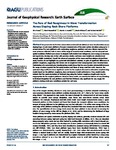The Role of Bed Roughness in Wave Transformation Across Sloping Rock Shore Platforms
| dc.contributor.author | Poate, Tim | |
| dc.contributor.author | Masselink, Gerd | |
| dc.contributor.author | Austin, MJ | |
| dc.contributor.author | Dickson, M | |
| dc.contributor.author | McCall, R | |
| dc.date.accessioned | 2018-01-29T09:50:33Z | |
| dc.date.available | 2018-01-29T09:50:33Z | |
| dc.date.issued | 2018-01 | |
| dc.identifier.issn | 2169-9003 | |
| dc.identifier.issn | 2169-9011 | |
| dc.identifier.uri | http://hdl.handle.net/10026.1/10677 | |
| dc.description.abstract |
<jats:title>Abstract</jats:title><jats:p>We present for the first time observations and model simulations of wave transformation across sloping (Type A) rock shore platforms. Pressure measurements of the water surface elevation using up to 15 sensors across five rock platforms with contrasting roughness, gradient, and wave climate represent the most extensive collected, both in terms of the range of environmental conditions, and the temporal and spatial resolution. Platforms are shown to dissipate both incident and infragravity wave energy as skewness and asymmetry develop and, in line with previous studies, surf zone wave heights are saturated and strongly tidally modulated. Overall, the observed properties of the waves and formulations derived from sandy beaches do not highlight any systematic interplatform variation, in spite of significant differences in platform roughness, suggesting that friction can be neglected when studying short wave transformation. Optimization of a numerical wave transformation model shows that the wave breaker criterion falls between the range of values reported for flat sandy beaches and those of steep coral fore reefs. However, the optimized drag coefficient shows significant scatter for the roughest sites and an alternative empirical drag model, based on the platform roughness, does not improve model performance. Thus, model results indicate that the parameterization of frictional drag using the bottom roughness length‐scale may be inappropriate for the roughest platforms. Based on these results, we examine the balance of wave breaking to frictional dissipation for rock platforms and find that friction is only significant for very rough, flat platforms during small wave conditions outside the surf zone.</jats:p> | |
| dc.format.extent | 97-123 | |
| dc.language | en | |
| dc.language.iso | en | |
| dc.publisher | American Geophysical Union (AGU) | |
| dc.relation.uri | https://doi.org/10.24382/6rs1-dx40 | |
| dc.subject | wave transformation | |
| dc.subject | bed roughness | |
| dc.subject | rocky platform | |
| dc.subject | infragravity | |
| dc.title | The Role of Bed Roughness in Wave Transformation Across Sloping Rock Shore Platforms | |
| dc.type | journal-article | |
| dc.type | Journal Article | |
| plymouth.author-url | https://www.webofscience.com/api/gateway?GWVersion=2&SrcApp=PARTNER_APP&SrcAuth=LinksAMR&KeyUT=WOS:000425417100006&DestLinkType=FullRecord&DestApp=ALL_WOS&UsrCustomerID=11bb513d99f797142bcfeffcc58ea008 | |
| plymouth.issue | 1 | |
| plymouth.volume | 123 | |
| plymouth.publication-status | Published | |
| plymouth.journal | Journal of Geophysical Research: Earth Surface | |
| dc.identifier.doi | 10.1002/2017JF004277 | |
| plymouth.organisational-group | /Plymouth | |
| plymouth.organisational-group | /Plymouth/Faculty of Science and Engineering | |
| plymouth.organisational-group | /Plymouth/Faculty of Science and Engineering/School of Biological and Marine Sciences | |
| plymouth.organisational-group | /Plymouth/REF 2021 Researchers by UoA | |
| plymouth.organisational-group | /Plymouth/REF 2021 Researchers by UoA/UoA07 Earth Systems and Environmental Sciences | |
| plymouth.organisational-group | /Plymouth/Research Groups | |
| plymouth.organisational-group | /Plymouth/Research Groups/Marine Institute | |
| plymouth.organisational-group | /Plymouth/Users by role | |
| plymouth.organisational-group | /Plymouth/Users by role/Academics | |
| plymouth.organisational-group | /Plymouth/Users by role/Researchers in ResearchFish submission | |
| dcterms.dateAccepted | 2017-12-09 | |
| dc.identifier.eissn | 2169-9011 | |
| dc.rights.embargoperiod | Not known | |
| rioxxterms.funder | EPSRC | |
| rioxxterms.identifier.project | Waves Across Shore Platforms | |
| rioxxterms.versionofrecord | 10.1002/2017JF004277 | |
| rioxxterms.licenseref.uri | http://www.rioxx.net/licenses/all-rights-reserved | |
| rioxxterms.type | Journal Article/Review | |
| plymouth.funder | Waves Across Shore Platforms::EPSRC | |
| plymouth.funder | Waves Across Shore Platforms::EPSRC |


